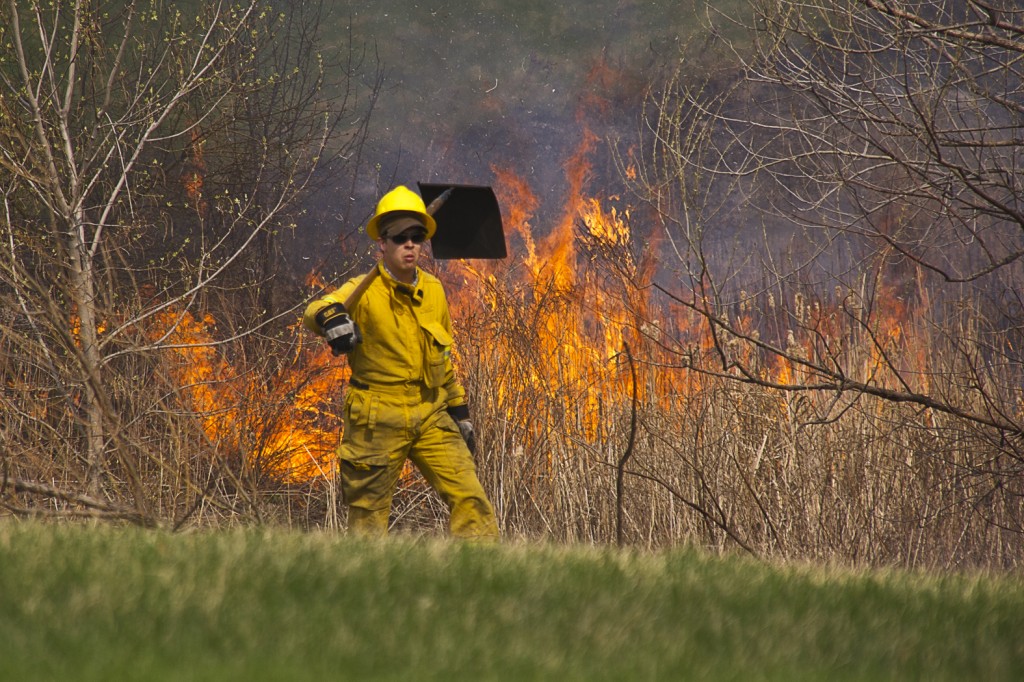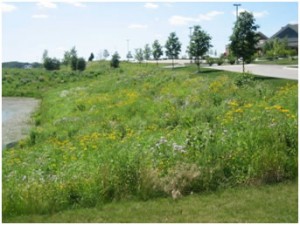Normally Friday nights are pretty quiet at RU’s Schaumburg Campus. But not this past Friday night. Despite pounding rain and a brief hailstorm, around 60 people converged on Alumni Hall for the special Earth Day screening of the new Aldo Leopold documentary film, Green Fire.  In attendance were several Roosevelt faculty, staff, and students; but the bulk of the crowd came from the larger community. Folks like Steve and Jill Flexman, veteran restoration volunteers from the Poplar Creek Prairie Stewards; Jean and Jim DeHorn of the Chicago chapter of Wild Ones; and a prospective student from Joliet Junior College who drove all the way from Joliet (just like me) to see the film and meet some current RU Sustainability Studies students.
In attendance were several Roosevelt faculty, staff, and students; but the bulk of the crowd came from the larger community. Folks like Steve and Jill Flexman, veteran restoration volunteers from the Poplar Creek Prairie Stewards; Jean and Jim DeHorn of the Chicago chapter of Wild Ones; and a prospective student from Joliet Junior College who drove all the way from Joliet (just like me) to see the film and meet some current RU Sustainability Studies students.
This small sampling of the eclectic audience at last night’s screening gives a hint of what proved to be a dynamic gathering of academics, environmental stewards, and social activists who live and work in the northwest suburban region . . . and beyond.  After the film we engaged in a spirited discussion of Leopold and his classic 1949 book A Sand County Almanac, local environmentalism, the need for a more ethical relation to the land (and each other), and the value of ecological stewardship. Schaumburg’s Sustainable Future, a website created as a collaborative research project by the students in my SUST 210 Sustainable Future class this spring at the Schaumburg Campus, aims to provide a platform for keeping that exciting conversation going.
After the film we engaged in a spirited discussion of Leopold and his classic 1949 book A Sand County Almanac, local environmentalism, the need for a more ethical relation to the land (and each other), and the value of ecological stewardship. Schaumburg’s Sustainable Future, a website created as a collaborative research project by the students in my SUST 210 Sustainable Future class this spring at the Schaumburg Campus, aims to provide a platform for keeping that exciting conversation going.
Special thanks go to Gavin Van Horn, Director of Midwest Cultures of Conservation for the Center for Humans and Nature in Chicago (one of Green Fire‘s co-producers), who helped me introduce the film and moderate discussion afterward; Jessie Crow Mermel, a Sustainability Studies major and educator at Angelic Organics farm in Caldonia IL, who planted the idea of getting Green Fire to screen at Roosevelt and provided a student’s perspective on the important of Leopold’s Land Ethic in her introductory remarks; Schaumburg Campus Provost Doug Knerr, who provided planning support and encouragement for this event from the get-go; RU professional staff Yvette Joseph, Jackie Talerico, Tim Hopkins, Jon Resele, and Sharon Del Prete for their incredible support and hard work in the planning and logistics for last night’s screening; and the students of my SUST 210 class — particularly Mary Beth Radeck, who provided superb content for and great student leadership on this project.


